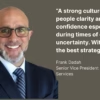
It’s basic human nature. We’re drawn to some people more than others. It should be easy to figure out why this is but it’s not. I’m talking about the chemistry that exists, or not, between individuals. Sometimes it’s there and people click. Sometimes it’s not and people just don’t get along. When this happens in our personal lives, we can make a choice as to whether or not we want to spend time with this person. At work and as a leader, we don’t always have that option.
As a coach, I’m passionate about helping leaders grow and develop. I engage with clients through honest and introspective debriefs and discussions. We identify areas of leadership strength and potential areas of opportunity. Often the focus is on developing self-awareness and building a collaborative and high performing team. We’ll set goals, craft an action plan and we’re off! Plans are straight-forward and actionable.
Every once in a while, however, I’m presented with both a statement and a question: “I just don’t like this person. What do I do about that?!” This can really stop a leader in their tracks. What can you do?
Following are a few thoughts for you to consider:
- Own It. Recognize that this person is just not someone you’d be friends with outside of work and that’s okay. If you have a strong need to like everyone and for everyone to like you, this may be hard to get your head around. The truth of the matter is, you don’t have to be friends with everyone. You just have to co-exist in the same group or on the same team. Be polite and treat people with respect.
- Know Your Values. I read somewhere that a common source of interpersonal conflict is conflicting values. For example, do you value punctuality? Risk taking? Selflessness? Advancement? The person you’re having difficulty creating a connection with might have different values. Conflicting values can leave you to feel frustrated or perturbed. Recognize that other people have the right to feel differently and that’s okay. Being grounded in what’s important is key to your self-awareness. You’re both at the company to perform at your best.
- Differences in Behavior and Style. We all have different personalities, strengths and styles. Differing perspectives can lead to conflict and not liking someone, especially if they approach problems, communication, decision making, team interactions and details very differently than we do. An incredibly effective tool we use to better understand ourselves and others is the PI Behavioral Assessment™. It measures our behaviors, strengths and style, as well as what drives and motivates us. When we understand our own style, we are in a better place to be receptive to people that may have a different approach to work than we do.
- Be Patient. Intellectually you know conflicting styles, values and/or lack of chemistry are bound to happen. Give yourself the gift of patience, tolerance and acceptance. It may not be easy but, when interacting with this person, mentally steel yourself. Take a deep breath or count to three in your head before an interaction. One of my favorite strategies is before you enter a meeting, respond to an email or take a call, sigh. Out loud. It helps to diffuse the anger and anxiety. Try it.
- Walk Away. Know your triggers and when your buttons are apt to be pushed. It’s better to be late to a meeting because you took a lap around the office or Google cute puppy videos before engaging with this person.
- Have an Honest Conversation. When the time is right, chat with your colleague. With good intentions and courageous conversation, get to know each other. Maybe you just got off on the wrong foot. It happens! Do you know each other and your backgrounds? What makes you tick, your interests and hobbies? What are your aspirations? What keeps you awake at night? Have you made an effort to establish a relationship and get to know each other or are you stuck in judgment mode – “I don’t like what I’ve seen and experienced, so I will judge the person on the surface vs. giving them the benefit of the doubt.” We all know the parable, don’t judge a book by its cover.
Contrary to what we were told in kindergarten, we’re not all friends. Guess what? We don’t need to be. Sure, it would be easier but that’s not real life. Outside of work, you can choose to be friends or not. At work, you choose to work on a relationship because it’s the right thing to do to support organizational health and goals. And who knows? If you take the time to better understand yourself and others, you may be able to overcome some of those differences and issues.
How can we help?
When people don’t get along, there is tension. This disharmony negatively impacts personal and team effectiveness and, leads to an overall drop in morale and engagement. At MCG Partners, we work with leaders at all levels of the organization who are passionate about being the best leader they can be; for themselves and for their teams. Through coaching, 360 feedback, leadership development and facilitating positive team dynamics we work with leaders to develop self-awareness and build their personal tool kit to help them successfully navigate even the thorniest of employee and team issues. To discuss your situation and learn how we can help you, please contact Heather Wood heather.wood@mcgpartners.com.
About the Author: Heather Wood
About MCG Partners
MCG Partners is a leadership and talent optimization firm– aligning your business and people strategy for maximum results. MCG Partners a woman-owned consultancy and is also a Predictive Index® (PI®) certified partner. To learn more please contact John Griffith at john.griffith@mcgpartners.com and at mcgpartners.com
[/fusion_text][/fusion_builder_column][fusion_builder_column type=”1_4″ layout=”1_1″ spacing=”” center_content=”no” link=”” target=”_self” min_height=”” hide_on_mobile=”small-visibility,medium-visibility,large-visibility” class=”” id=”” background_color=”” background_image=”” background_position=”left top” background_repeat=”no-repeat” hover_type=”none” border_size=”0″ border_color=”” border_style=”solid” border_position=”all” padding_top=”” padding_right=”” padding_bottom=”” padding_left=”” margin_top=”” margin_bottom=”” animation_type=”” animation_direction=”left” animation_speed=”0.3″ animation_offset=”” last=”no”][fusion_widget_area name=”avada-custom-sidebar-blogsinglepagesidebar” title_size=”” title_color=”” background_color=”” padding_top=”” padding_right=”” padding_bottom=”” padding_left=”” hide_on_mobile=”small-visibility,medium-visibility,large-visibility” class=”” id=”” /][/fusion_builder_column][/fusion_builder_row][/fusion_builder_container]








